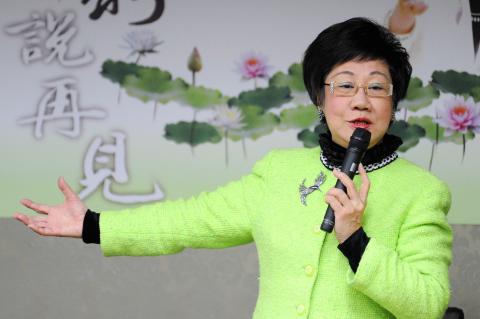Former vice president Annette Lu (呂秀蓮) made it clear yesterday that she will run for president next year, a decision she said she would formally announce on Monday at a public rally in Taipei.
Lu, who was former president Chen Shui-bian’s (陳水扁) running mate in 2000 and 2004, said she was prompted to enter the campaign by the recent row with the Philippines over the deportation of 14 Taiwanese fraud suspects to China.
She said both the Chinese Nationalist Party (KMT) and the Democratic Progressive Party (DPP), to which she belongs, mishandled the incident.

Photo: George Tsorng, Taipei Times
If Taiwan’s international status remains unclear and the ruling and opposition parties are only capable of mudslinging, “the Philippines incident will only be the beginning of many problems facing this country,” she said.
Asked why she thought former premier Su Tseng-chang (蘇貞昌) and DPP Chairperson Tsai Ing-wen (蔡英文) have higher poll ratings than she does, Lu said that was because they both ran for office recently, so it was only natural they had greater popularity now.
“How could they not enjoy the media limelight?” Lu said.
Su was the DPP’s candidate for Taipei mayor in November and its vice presidential candidate in 2008. Tsai was the DPP’s candidate for New Taipei City (新北市) mayor in November and has been DPP chairperson for the past three years.
Saying her experience as vice president has made her uniquely qualified for the presidency, Lu said she wants to deal with many of the issues she could not tackle as vice president because of the constitutional limits on that office’s power.
She challenged the DPP to find another candidate who has the expertise to compete against President Ma Ying-jeou (馬英九).
“Given Ma’s educational and political experience, which DPP candidate is strong enough to beat him?” Lu asked.
She said the DPP would poll 15,000 people by telephone as part of its primary process, with questions that put the various DPP presidential hopefuls up against Ma.
Lu vehemently opposed the party leadership last month when it decided to change the nomination process and use a national poll to select its presidential candidate. Lu wanted party members to have more of a say in the nomination process.
Lu was skeptical of the process yesterday, saying it was “not that easy” for all the DPP factions to “discuss and coordinate” and agree on a candidate.
However, she said she would support a candidate if she believed that person had the ability to handle Taiwan’s “five crises” — a phrase commonly used in DPP circles to refer to national sovereignty, military readiness, diplomatic isolation, financial stability and the prosperity of the people.
Tsai and most DPP lawmakers yesterday said they would respect Lu’s decision to enter the race, one was not happy that Lu had been so critical of Tsai and Su.
“She should talk about the nation’s major issues, instead of acting childishly and criticizing the party’s chairperson or the former premier,” DPP Legislator Kuan Bi-ling (管碧玲) said.

ENDEAVOR MANTA: The ship is programmed to automatically return to its designated home port and would self-destruct if seized by another party The Endeavor Manta, Taiwan’s first military-specification uncrewed surface vehicle (USV) tailor-made to operate in the Taiwan Strait in a bid to bolster the nation’s asymmetric combat capabilities made its first appearance at Kaohsiung’s Singda Harbor yesterday. Taking inspiration from Ukraine’s navy, which is using USVs to force Russia’s Black Sea fleet to take shelter within its own ports, CSBC Taiwan (台灣國際造船) established a research and development unit on USVs last year, CSBC chairman Huang Cheng-hung (黃正弘) said. With the exception of the satellite guidance system and the outboard motors — which were purchased from foreign companies that were not affiliated with Chinese-funded

PERMIT REVOKED: The influencer at a news conference said the National Immigration Agency was infringing on human rights and persecuting Chinese spouses Chinese influencer “Yaya in Taiwan” (亞亞在台灣) yesterday evening voluntarily left Taiwan, despite saying yesterday morning that she had “no intention” of leaving after her residence permit was revoked over her comments on Taiwan being “unified” with China by military force. The Ministry of the Interior yesterday had said that it could forcibly deport the influencer at midnight, but was considering taking a more flexible approach and beginning procedures this morning. The influencer, whose given name is Liu Zhenya (劉振亞), departed on a 8:45pm flight from Taipei International Airport (Songshan airport) to Fuzhou, China. Liu held a news conference at the airport at 7pm,

Taiwan was ranked the fourth-safest country in the world with a score of 82.9, trailing only Andorra, the United Arab Emirates and Qatar in Numbeo’s Safety Index by Country report. Taiwan’s score improved by 0.1 points compared with last year’s mid-year report, which had Taiwan fourth with a score of 82.8. However, both scores were lower than in last year’s first review, when Taiwan scored 83.3, and are a long way from when Taiwan was named the second-safest country in the world in 2021, scoring 84.8. Taiwan ranked higher than Singapore in ninth with a score of 77.4 and Japan in 10th with

GRIDLOCK: The National Fire Agency’s Special Search and Rescue team is on standby to travel to the countries to help out with the rescue effort A powerful earthquake rocked Myanmar and neighboring Thailand yesterday, killing at least three people in Bangkok and burying dozens when a high-rise building under construction collapsed. Footage shared on social media from Myanmar’s second-largest city showed widespread destruction, raising fears that many were trapped under the rubble or killed. The magnitude 7.7 earthquake, with an epicenter near Mandalay in Myanmar, struck at midday and was followed by a strong magnitude 6.4 aftershock. The extent of death, injury and destruction — especially in Myanmar, which is embroiled in a civil war and where information is tightly controlled at the best of times —